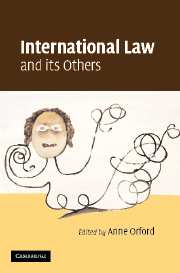Book contents
- Frontmatter
- Contents
- Acknowledgments
- Notes on the contributors
- 1 A jurisprudence of the limit
- PART I Sovereignty otherwise
- PART II Human rights and other values
- PART III The relation to the other
- 10 Completing civilization: Creole consciousness and international law in nineteenth-century Latin America
- 11 From ‘savages’ to ‘unlawful combatants’: a postcolonial look at international humanitarian law's ‘other’
- 12 Lost in translation: re-scripting the sexed subjects of international human rights law
- 13 Flesh made law: the economics of female genital mutilation legislation
- PART IV History's other actors
- Index
13 - Flesh made law: the economics of female genital mutilation legislation
Published online by Cambridge University Press: 20 July 2009
- Frontmatter
- Contents
- Acknowledgments
- Notes on the contributors
- 1 A jurisprudence of the limit
- PART I Sovereignty otherwise
- PART II Human rights and other values
- PART III The relation to the other
- 10 Completing civilization: Creole consciousness and international law in nineteenth-century Latin America
- 11 From ‘savages’ to ‘unlawful combatants’: a postcolonial look at international humanitarian law's ‘other’
- 12 Lost in translation: re-scripting the sexed subjects of international human rights law
- 13 Flesh made law: the economics of female genital mutilation legislation
- PART IV History's other actors
- Index
Summary
Every man child among you shall be circumcised. And ye shall circumcise the flesh of your foreskin; and it shall be a token of the covenant betwixt me and you.
Legislation to prohibit the practices described as ‘female genital mutilation’ has become an international franchise. Laws which mark the needs, desires and demands of the subject of ‘mutilation’, together with the subject who is apparently ‘non-mutilated’, have been enacted with unprecedented enthusiasm over the last two decades, in countries we might now call the ‘coalition of the willing’. The laws are strikingly similar and most of them include the phrase ‘female genital mutilation’ to describe the many practices that are said to occur in these countries and beyond. Indeed, in Australia, this term is called upon ‘to embrace all types of the practice’. The laws, and the research and consultations which preceded their enactment, also describe the sexual, psychological, hygiene and aesthetic needs and desires of the subject. In short, the process of making the laws and the laws themselves combine to provide a manual for Being. Not just any being, of course, for the laws are based upon empirical and theoretical research, public response and popular fiction produced largely in, and for, Western consumption. The laws are a manual for the franchising of a Western subjectivity whose sexual, psychological, aesthetic and hygiene requirements are based upon those of what Gayatri Spivak has termed the capital S Subject, what the Family Law Council in Australia has termed the ‘non-mutilated’ woman and what I will argue in this paper is the international subject.
- Type
- Chapter
- Information
- International Law and its Others , pp. 357 - 386Publisher: Cambridge University PressPrint publication year: 2006
- 1
- Cited by



